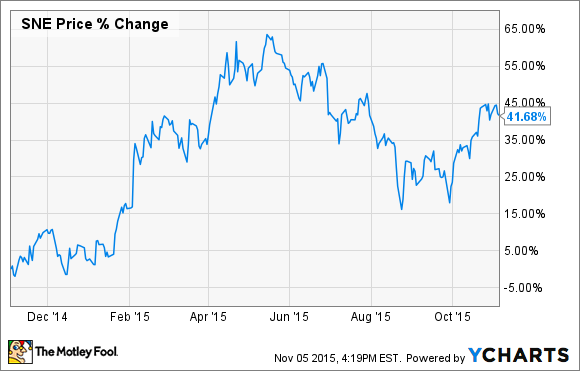Although it flies well below the radar compared to today's tech titans, shares of Japanese turnaround story Sony (SONY 3.60%) have reversed course in their own right over the past year.
Having endured and eventually emerged from a brutal multiyear restructuring, Sony today is leaner and meaner than at any time in recent memory, a fact underscored by the company's recent earnings beat.
However, as it prepares for the crucial holiday quarter, Sony is also slashing the prices of its PlayStation 4 consoles to take on longtime gaming nemesis Microsoft (MSFT -0.40%), a move its investors should heartily applaud.
Sony continues to slash PS4 prices
About a month ago, Sony lowered the cost of its PlayStation 4 gaming console throughout much of continental Europe from €399 to €349, or roughly US$396. More specifically, the price cut will affect PS4 pricing across Austria, Benelux, France, Germany, Ireland, Italy, Switzerland, Portugal, and Spain. For those not closely following the gaming industry, the move follows earlier price reductions in the United States, Japan, and Canada, so this move was widely anticipated among gaming analysts. Furthermore, it bodes extremely well for Sony and the PlayStation 4 for a few reasons.
To say Sony's PS4 has proven a mere success would meaningfully understate the device's sales momentum. Here's a quick breakdown of how global console sales have fared since the "big three" console manufacturers launched their most recent generation of devices – the Sony PlayStation 4, the Microsoft Xbox One, and the Nintendo WiI U.

Source: ArsTechnica
Hopefully, you agree this data favors Sony to a pretty meaningful degree. It's also worth briefly noting that Sony's PS4 enjoys an even more dramatic lead in Europe, where it's price reduction only recently went into effect. So clearly this positions Sony to likely extend market share gains going into the holiday season. However, especially with the benefit of some historic context, investors should indeed take note of the true dominance of the PS4.
The last generation of the console wars included familiar combatants Microsoft, Sony, and Nintendo facing off with their respective consoles -- the Xbox 360, the PlayStation 3, and the original Wii. Although not perfectly overlapping, the three consoles competed over an 8-year period ranging from roughly 2005 to 2013. And thanks to data from GeekWire in mid-2013, we can get a pretty definitive sense that the last generation of the console wars was far less competitive than the first.

Source: GeekWire
Granted Sony, Microsoft, and Nintendo have only had their next-gen consoles on the market since 2012 and 2013, depending on the exact system in question. However, between Sony's early lead and its aggressive pricing moves, it appears the company remains intent on maintaining or extending its lead. However, does this recent momentum help make Sony's stock a buy today?
Is Sony a buy today?
Although its stock has performed undeniably well over the past year, investing in Sony still carries its fair share of risk in my eyes.
Sony proved profitable in its most recent report, and it maintained its guidance to generate a profit of about $1.2 billion for its entire 2015 fiscal year. To boot, some of Sony's reporting segments also legitimately enjoy leadership in their industries, most notably its image semiconductor unit that supplies the camera chips to iPhones and other devices. However, Sony also enjoys plenty of exposure to business lines where its inability to innovate has cost it dearly in the past. Additionally, segments like music and, especially, movies are prone to "boom and bust" performances depending on the strength of their content lineups during any given reporting period. Indeed, investors saw this dynamic play out in Sony's Pictures division, which barely broke even during the summer blockbuster season on nearly $3 billion in sales
To be clear, things are getting better at Sony. Its most recent earnings report and its bold moves to further dominate the gaming industry both clearly signal the company indeed enjoys legitimate opportunities. However, in my eyes, those advantages are offset at least to some degree by potentially problematic segments, which is why I still maintain investors might do well to take their hard-earned savings elsewhere.






